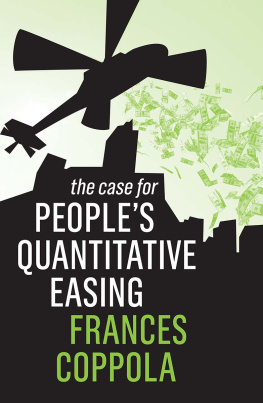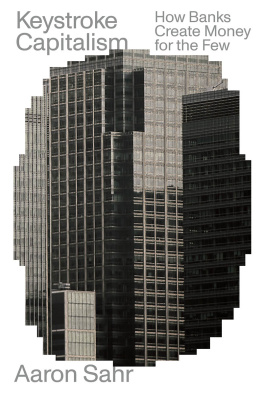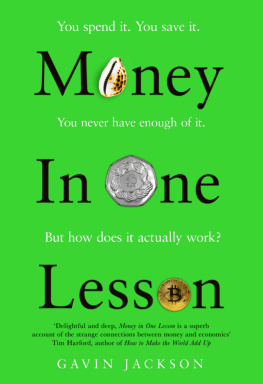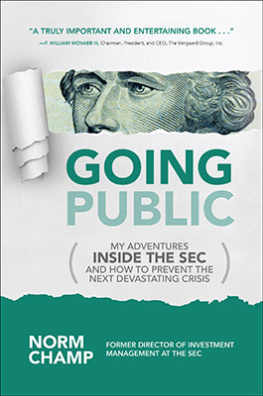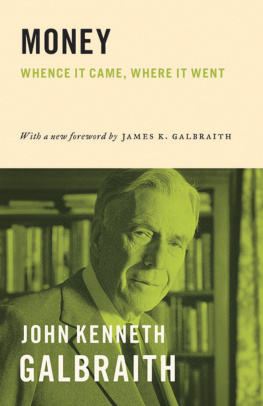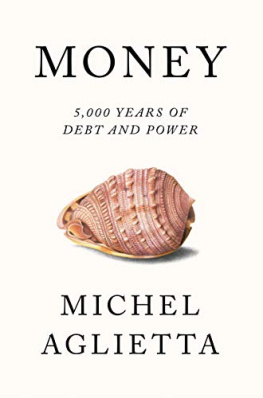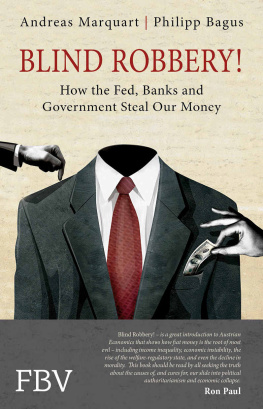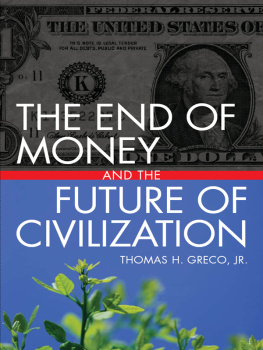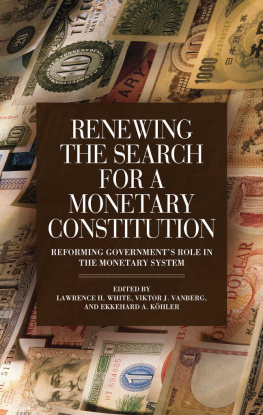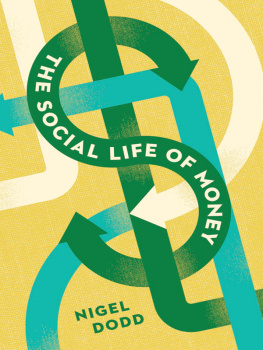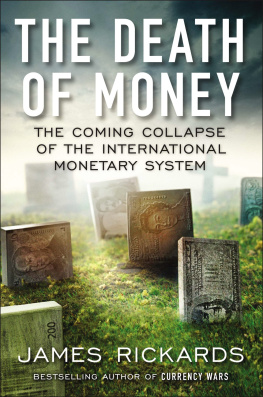Table of Contents
First published in the UK in 2012 by Positive Money
Copyright 2012 Andrew Jackson and Ben Dyson
All rights reserved
The authors have asserted their rights in accordance
with the Copyright, Designs and Patents Act 1988
Positive Money
205 Davina House
137-149 Goswell Road
London EC1V 7ET
Tel: +44 (0) 207 253 3235
www.positivemoney.org
ISBN: 978-0-9574448-0-5
Kindle version produced by Herman Mittleholzer and Henry Edmonds
A CKNOWLEDGEMENTS
We would like to thank Graham Hodgson for his numerous contributions to this book, as well as Mario Visel and Mariia Domina, for their work on historical episodes of state money creation and international finance respectively.
The discussion of the existing banking system in the first two chapters of this book is based on research and thinking by Josh Ryan-Collins, Tony Greenham and Richard Werner and Andrew Jackson for the book Where Does Money Come From? (published by the New Economics Foundation) and we are very grateful for their input and considerable expertise.
We are also grateful to the team at Positive Money: Mira Tekelova for holding the fort while the book was written, Henry Edmonds for his work on the design and layout, and Miriam Morris, James Murray and a number of other tireless volunteers who have helped with the editing and proofing.
We are indebted to Jamie Walton for the numerous conversations in 20102011 that led to the development and strengthening of these proposals, and Joseph Huber and James Robertson for providing the starting point in their book Creating New Money . These ideas were further developed with Josh Ryan-Collins, Tony Greenham and Richard Werner in a joint submission to the Independent Commission on Banking in late 2010.
We would also like to thank all those who have provided helpful insights, comments and suggestions on the proposals and the manuscript. We are particularly grateful for the expertise and guidance of Dr David Bholat, Dr Fran Boait, Prof. Victoria Chick, Prof. Herman Daly, Prof. Joseph Huber, Peter Kellow, Dr Michael Reiss, and James Robertson.
Finally, we would like to express our gratitude to the James Gibb Stuart Trust and other supporters of Positive Money, without whom the book would not have been written. Of course, the contents of this book, and any mistakes, errors or omissions remain entirely the responsibility of the authors.
A NOTE FOR READERS OUTSIDE THE UK
Although this book is written with the UK banking system in mind, the analysis is equally applicable to the banking and monetary system of any modern economy. While there are minor differences in rules and regulations between countries, almost all economies today are based on a monetary system that is fundamentally the same as that of the UK.
Equally, the reforms proposed here can be applied to any country that has its own currency, or any currency bloc, with only minor tailoring to the unique situation of each country.
F OREWORD
Money ranks with fire and the wheel as an invention without which the modern world would be unimaginable. Unfortunately, out-of-control money now injures more people than both out-of-control fires and wheels. Loss of control stems from the privilege enjoyed by the private banking sector of creating money from nothing and lending it at interest in the form of demand deposits. This power derives from the current design of the banking system, and can be corrected by moving to a system where new money can only be created by a public body, working in the public interest.
This is simple to state, but difficult to bring about. Andrew Jackson and Ben Dyson do a fine job of explaining the malfunctioning present banking system, and showing the clear institutional reforms necessary for a sound monetary system. The main ideas go back to the leading economic thinkers of 50 to 75 years ago, including Irving Fisher, Frank Knight and Frederick Soddy. This book revives and modernises these ideas, and shows with clarity and in detail why they must be a key part of economic reform today.
Professor Herman Daly
Professor Emeritus
School of Public Policy
University of Maryland
Former Senior Economist
at the World Bank
S UMMARY OF KEY POINTS
Chapter 1: A Short History of Money
When early-day goldsmiths started to provide banking services to members of the public, they would issue depositors with paper receipts. These receipts started to circulate in the economy, being used in place of metal money and becoming a form of paper money. In 1844 the government prohibited the issuance of this paper money by any institution other than the Bank of England, returning the power to create money to the state. However, the failure to include bank deposits in the 1844 legislation allowed banks to continue to create a close substitute for money, in the form of accounting entries that could be used to make payments to others via cheque. The rise of electronic means of payment (debit cards and internet banking) has made these accounting entries more convenient to use as money than physical cash. As a result, today bank deposits now make up the vast majority of the money in the economy.
Chapter 2: Money & Banking Today
The vast majority of money today is created not by the state, as most would assume, but by the private, commercial (or high-street) banking sector. Over 97% of money exists in the form of bank deposits (the accounting liabilities of banks), which are created when banks make loans or buy assets. We explain how this process takes place and show the (simplified) accounting that enables banks to create money. We also look at the crucial role of central bank reserves (money created by the Bank of England) in the payments system, and explain why it is that banks do not need deposits from savers or central bank reserves in order to lend.
Chapter 3: What Determines the Money Supply?
With most money being created by banks making loans, the level of bank lending determines the money supply. What determines how much banks can lend? The demand for credit (lending) will always tend to be high due to: insufficient wealth, the desire to speculate (including on house prices), and various legal incentives.
The supply of credit depends on the extent to which banks are incentivised to lend. During benign economic conditions banks are incentivised to lend as much as possible creating money in the process by the drive to maximise profit, and this process is exacerbated through the existence of securitisation, deposit insurance, externalities and competition. The regulatory factors that are meant to limit the creation of money such as capital requirements, reserve ratios and the setting of interest rates by the Monetary Policy Committee are for a variety of reasons ineffective.
Yet despite the high demand for credit, the strong incentives for banks to create money through lending, and the limited constraints on their ability to do so, banks do not simply lend to everyone who wants to borrow. Instead, they ration their lending. For this reason, the level of bank lending, and therefore the money supply, is determined mainly by their willingness to lend, which depends on the confidence they have in the health of the economy.
Chapter 4: Economic Consequences of the Current System
The economic effects of money creation depend on how that money is used. If newly created money is used to increase the productive capacity of the economy, the effect is unlikely to be inflationary. However, banks currently direct the vast majority of their lending towards non-productive investment, such as mortgage lending and speculation in financial markets. This does not increase the productive capacity of the economy, and instead simply causes prices in these markets to rise, drawing in speculators, leading to more lending, higher prices, and so on in a self-reinforcing process. This is known as an asset price bubble.




